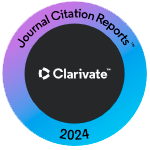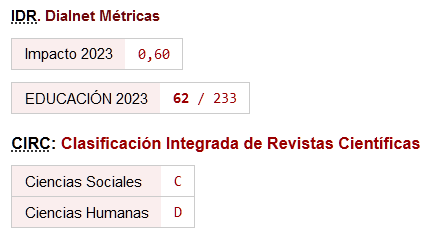Miedo al COVID-19 y agotamiento de la Enseñanza online en los Maestros Filipinos (Infantil - 12 años)
DOI:
https://doi.org/10.46661/ijeri.5853Palabras clave:
Efectos psicológicos, educación a distancia, profesores, pandemia, FilipinasResumen
La crisis de COVID-19 prácticamente magnificó el miedo normal de las personas, trayendo más resultados psicológicos negativos como el agotamiento laboral. Partiendo de esta suposición, este documento tuvo como objetivo comparar el miedo al COVID-19 y el agotamiento de la enseñanza remota a través de las características de la muestra y relacionar el miedo al COVID-19 con el agotamiento de la enseñanza remota. Siguiendo diseños de investigación comparativos y correlacionales, se seleccionó una muestra de 1069 profesores filipinos (Infantil- 12 años) para participar en la encuesta en línea. Los datos se analizaron mediante estadística descriptiva e inferencial. Los resultados mostraron que los docentes tienen un alto nivel de miedo al COVID-19 y un nivel moderado de agotamiento de la enseñanza a distancia. Además, el miedo de COVID-19 a los maestros no difirió significativamente en todas las características de la muestra evaluadas; sin embargo, el agotamiento de la enseñanza a distancia difirió significativamente según la edad, los ingresos mensuales, el nivel educativo y la experiencia docente, excepto el género. Además, se reveló que existe una relación significativa positiva y moderada entre el miedo al COVID-19 y el agotamiento de la enseñanza a distancia. Esta asociación lineal implica que a medida que aumenta el miedo al COVID-19 de los docentes, también aumenta el desgaste de la enseñanza a distancia. Considerando la actual persistencia de los casos de COVID-19 y el papel de los docentes en la fase de recuperación anticipada de la educación, los resultados del estudio indican la atención urgente de las autoridades educativas para desarrollar medidas para atender las necesidades de los docentes que puedan tener problemas psicológicos planteados por miedo al COVID-19 y al agotamiento de la enseñanza a distancia.
Descargas
Citas
Abdelghani, M., El-Gohary, H.M., Fouad, E. & Hassan, M. S. (2020). Addressing the Relationship Between Perceived Fear of COVID-19 Virus Infection and Emergence of Burnout Symptoms in a Sample of Egyptian Physicians During COVID-19 Pandemic: A Cross-Sectional Study. Middle East Curr Psychiatry 27, 70. https://doi.org/10.1186/s43045-020-00079-0
Ahorsu, D.K., Lin, C.Y., Imani, V., Saffari, M., Griffiths M. D., Pakpour, A. H., (2020). The fear of COVID-19 scale: Development and initial validation. Int J Ment Health Addiction. https://doi.org/10.1007//s11469-020-00270-8
Alyami, M., Marcus, H., Krägeloh, C., & Alyami, H. (2020). Psychometric Evaluation of the Arabic Version of the Fear of COVID-19 Scale. Int J Ment Health Addict. doi: 10.1007/s11469-020-00316-x
Aperribai, L., Cortabarria, L., Aguirre, T., Verche, E., & Borges, A. (2020). Teacher's Physical Activity and Mental Health During Lockdown Due to the COVID-2019 Pandemic. Front Psychology. https://doi.org/10.3389/fpsyg.2020.577886
Barello S., Palamenghi L., Graffigna G. (2020, May 27). Burnout and Somatic Symptoms Among Frontline Healthcare Professionals at the Peak of the Italian COVID-19 Pandemic Psychiatry Res. 2020;290:113129. pmid:32485487
Barling, J. (1996). The prediction, experience, and consequences of workplace violence. In G. R. VandenBos & E. Q. Bulatao (Eds.), Violence on the job: Identifying risks and developing solutions (p. 29–49). American Psychological Association. https://doi.org/10.1037/10215-001
Barrios I., Ríos-González C., O’Higgins M., González I., García O., Díaz N. R., et al. . (2020). Psychometric properties of the Spanish version of the Fear of COVID-19 Scale (FCV-19S). Int. J. Ment. Heal. Addict, 1–14. doi: 10.21203/RS.3.RS-33345/V1
Bouckenooghe, D. (2009). Change recipients’ attitudes toward change: A review study. Vlerick Leuven Gent Working Paper Series, 14, 201-217. Retrieved from https://public.vlerick.com/Publications/6f43ee88-6aa9-e011-8a89-005056a635ed.pdf
Cervantes-Guevara, G., Maciel-Saldierna, M., Elizondo-Hernández, E. et al. (2021). Fear of COVID-19 in High School Personnel: A Survey Study in Western Mexico. Int J Ment Health Addiction. https://doi.org/10.1007/s11469-020-00473-z
Crossman, A. (2020). What is a Snowball Sample in Sociology? ThoughtCo. Retrieved from https://www.thoughtco.com/snowball-sampling-3026730
Curtis, E. A., Comiskey, C., Dempsey, O. (2016) Importance and use of correlational research. Nurse Researcher, 23(6), 20-25. doi: 10.7748/nr.2016.el1382
Daniels (Eds.). A day in the life of a happy worker (pp. 114–131). Hove, Sussex: Psychology Press.
Delamarter, J. & Ewart, M. (2020). Responding to Student Teachers' Fears: How We're Adjusting during the COVID-19 Shutdowns. Northwest Journal of Teacher Education, 15 (1), Article 3. https://doi.org/10.15760/nwjte.2020.15.1.3
Demerouti, E., Bakker, A. B., Nachreiner, F., & Ebbinghaus, M. (2002). From mental strain to burnout. European Journal of Work and Organizational Psychology, 11(4), 423–441. https://doi.org/10.1080/13594320244000274
Doshi, D., Karunakar, P., Sukhabogi, J. R., Prasanna, J. S., & Mahajan, S. V. (2020). Assessing Coronavirus Fear in Indian Population Using the Fear of COVID-19 Scale. International journal of mental health and addiction, 1–9. Advance online publication. https://doi.org/10.1007/s11469-020-00332-x
Duarte, I., Teixeira, A., Castro, L., Marina, S., Ribeiro, C., Jacome, C., Martins, V., Vaz, I. R., Pinheiro, H. C., Silva, A. R., Ricou, M., Sousa, B., Alves, C., Loiveria, A., Silva, P., Nunes, R., & Serrao, C. (2020). Burnout among Portuguese healthcare workers during the COVID-19 pandemic. BMC Public Health. https://doi.org/10.1186/s12889-020-09980-z
Fisher, M. H. (2011). Factors Influencing Stress, Burnout, and Retention of Secondary Teachers. Current Issues in Education, 14(1). Retrieved from http://cie.asu.edu/
Fitzpatrick, K., Harris, C., Drawve, G. (2020). Fear of COVID-19 and the Mental Health Consequences in America. American Psychological Association ISSN: 1942-9681. http://dx.doi.org/10.1037/tra0000924
Flores, M. A., & Swennen, A. (2020) The COVID-19 Pandemic and its Effects on Teacher Education, European Journal of Teacher Education, 43 (4), 453-456. https://doi.org/10.1080/02619768.2020.1824253
Fried, A. L., & Fisher, C. B. (2016). Moral Stress and Job Burnout Among Frontline Staff Conducting Clinical Research on Affective and Anxiety Disorders. Professional psychology, research and practice, 47(3), 171–180. https://doi.org/10.1037/pro0000060
Gross, S., Meier, L. L., & Semmer, N. K. (2013). Latent growth modeling applied to diary data: The trajectory of vigor across a working week as an illustrative example. In A. B. Bakker, & K.
Giusti, E. M., Pedroli, E., D’Aniello G. E., Badiale, C.S., Pietrabissa, G., Manna, C., Badiale, M. S., Riva, G.,, Castelnuovo, G., & Molinari, E. (2020). The Psychological Impact of the COVID-19 Outbreak on Health Professionals: A Cross-Sectional Study Front Psychology. https://doi.org/10.3389/fpsyg.2020.01684
Gustafsson, H., Sagar, S., & Stenling, A. (2016). Fear of Failure, Psychological Stress and Burnout Among Adolescent Athletes Competing in High Level Sport. Scandinavian Journal of Medicine and Science in Sports, 27. doi: 10.1111/sms.12797.
Gross, S., Meier, L. L., & Semmer, N. K. (2013). Latent growth modeling applied to diary data: The trajectory of vigor across a working week as an illustrative example. In A. B. Bakker & K. Daniels (Eds.), Current issues in work and organizational psychology. A day in the life of a happy worker (p. 114–131). Psychology Press.
Haktanir, A., Seki, T. & Dilmaç, B. (2020). Adaptation and evaluation of Turkish version of the fear of COVID-19 Scale, Death Studies. DOI: 10.1080/07481187.2020.1773026
Hanson, G. C., Perrin, N. A., Moss, H., Laharnar, N., & Glass, N. (2015). Workplace violence against homecare workers and its relationship with workers’ health outcomes: a cross-sectional study. BMC public health, 15, 11. https://doi.org/10.1186/s12889-014-1340-7
Hayes, S., Priestley, J., Ishmakhametov, N., & Ray, H., "“I’m not Working from Home, I’m Living at Work”: Perceived Stress and Work-Related Burnout before and during COVID-19" (2020). Faculty Publications. 4607. https://digitalcommons.kennesaw.edu/facpubs/4607
Hidalgo, R. A. J., Pantaleon, Y., Dios, I., & Falla, D. (2020). Fear of COVID-19, Stress, and Anxiety in University Undergraduate Students: A Predictive Model for Depression. Front Psychology. https://doi.org/10.3389/fpsyg.2020.591797
Hu, D., Kong, Y., Li, W., Han, Q., Zhang, X., & Zhu, L.X. (2020). Frontline Nurses’ Burnout, Anxiety, Depression, and Fear Statuses and their Associated Factors During the COVID-19 Outbreak in Wuhan, China: A Large-Scale Cross-Sectional Study. EClinicalMedicine. https://doi.org/10.1016/j.eclinm.2020.100424
Huo, L., Zhou, Y., Li, S., Ning, Y., Zeng, L. Liu, Z., Qian, W., Yang, J., Zhou, X., Liu, T., & Zhang, X. (2020). Burnout and its Relationship with Depressive Symptoms in Medical Staff During the COVID-19 Epidemic in China
Kraft, M., Simon, N., & Lyon, M. (2020). Sustaining a Sense of Success: The Importance of Teacher Working Conditions During the COVID-19 Pandemic. EdWorkingPaper, 20-279. Retrieved from Annenberg Institute at Brown University: https://doi.org/10.26300/35nj-v890
Lazarus, R. S., & Folkman, S. (1984). Stress, appraisal, and coping. New York: Springer.
Li, Q., Miao, Y., Zeng, X., Tarimo, C., Wu, C., & Wu, J. (2020). Prevalence and factors for anxiety during the coronavirus disease 2019 (COVID-19) epidemic among the teachers in China. Journal of Affective Disorder. https://doi.org/10.1016/j.jad.2020.08.017
Marchetti. A., Di Dio. C., Massaro, D., and Manzi. F., (2020). The Psychosocial Fuzziness of Fear in the Coronavirus (COVID-19) Era and the Role of Robots. Front. Psychol. 11:2245. doi: 10.3389/fpsyg.2020.02245
Maslach, C., & Leiter, M. P. (2016). Understanding the burnout experience: recent research and its implications for psychiatry. World psychiatry: Official journal of the World Psychiatric Association (WPA), 15(2), 103–111. https://doi.org/10.1002/wps.20311
Masuyama, A., Shinkawa, H. & Kubo, T. (2020) Validation and Psychometric Properties of the Japanese Version of the Fear of COVID-19 Scale Among Adolescents. Int J Ment Health Addiction. https://doi.org/10.1007/s11469-020-00368-z
Mertens, G., Gerritsen, L. Duijndam, S., Salemink, E., Engelhard, M. (2020). Fear of the Coronavirus (COVID-19): Predictors in an Online Study Conducted. Journal of Anxiety Disorders. https://doi.or/10.1016/j.janxdis.2020.102258
Moehle K.A., & Levitt E.E. (1991) The History of the Concepts of Fear and Anxiety. In: Walker C.E. (eds) Clinical Psychology. Applied Clinical Psychology. Springer, Boston, MA. https://doi.org/10.1007/978-1-4757-9715-2_6
Panisoara, I., Panisoara, G., Lazar, I., Chirca, R., & Ursu, A. (2020). Motivation and Continuance Intention towards Online Instruction among Teachers during the COVID-19 Pandemic: The Mediating Effect of Burnout and Technostress. Int. J. Environ. Res. Public Health, 17(21), 8002. https://doi.org/10.3390/ijerph17218002
Pishe, M. M. (2008). A Study of The Relationship Between Fear of Success and Burnout Among Working Women in Iranian Public Schools. Asian Academy of Management Journal. 13.
Portoghese, I., Galletta, M. M. P., Leiter, P. C., D’Aloja, E., & Campagna, M. (2017). Fear of Future Violence at Work and Job Burnout: A Diary Study on the Role of Psychological Violence and Job Control. Burnout Research, 7, 36-46, ISSN 2213-0586. https://doi.org/10.1016/j.burn.2017.11.003.
Prikhidko, A., Long, H., & Wheaton, M. G. (2020). The Effect of Concerns About COVID-19 on Anxiety, Stress, Parental Burnout, and Emotion Regulation: The Role of Susceptibility to Digital Emotion Contagion. Frontiers in public health, 8, 567250. https://doi.org/10.3389/fpubh.2020.567250
Rotas. E., Cahapay, M., Garcia, K., Carreon, T., Anoba, J. L., Amador, R. (2021). Evaluation of Fear of COVID-19 Scale in Professional Filipino Teachers. Submitted for publication.
Rogers, K.-A., & Kelloway, E. K. (1997). Violence at work: Personal and organizational outcomes. Journal of Occupational Health Psychology, 2(1), 63–71. https://doi.org/10.1037/1076-8998.2.1.63
Salloum , S. A., Saeed Al-Maroof, R., Ella Hassanien, A., & Shaalan, K. (2020): Fear from COVID-19 and technology adoption: the impact of Google Meet during Coronavirus pandemic, Interactive Learning Environments. https://doi.org/10.1080/10494820.2020.1830121
Sakib, N., Bhuiyan, A.K.M., Hossain, S., Al Mamun, F. et al. (2020). Psychometric Validation of the Bangla Fear of COVID-19 Scale: Confirmatory Factor Analysis and Rasch Analysis. International Journal of Mental Health and Addiction. DOI: 10.1007/s11469-020-00289-x
Satici, B., Gocet-Tekin, E., Deniz, M. E., & Satici, S. A. (2020a). Adaptation of the fear of COVID-19 scale: Its association with psychological distress and life satisfaction in Turkey. International Journal of Mental Health Addiction. 10.1007/s11469-020-00294-0.
Son, C., Hegde, S., Smith, A., Wang, X., & Sasangohar, F. (2020). Effects of COVID-19 on College Students' Mental Health in the United States: Interview Survey Study. Journal of medical Internet research, 22(9), e21279. https://doi.org/10.2196/21279
Steimer T. (2002). The Biology of Fear- and Anxiety-Related Behaviors. Dialogues in Clinical Neuroscience, 4(3), 231–249. https://doi.org/10.31887/DCNS.2002.4.3/tsteimer
Sokal, L., Trudel, L.E., & Babb, J. (2020). Canadian teachers’ attitudes toward change, efficacy, and burnout during the COVID-19 pandemic. International Journal of Educational Research Open. https://doi.org/10.1016/j.ijedro.2020.100016
Soraci, P., Ferrari, A., Abbiah, F., Del Fante, E., De Pace, R., Urso, A., Griffiths, M. (2020) Validation and Psychometric Evaluation of the Italian Version of the Fear of COVID-19 Scale. International Journal of Mental Health and Addiction. https://doi.org/10.1007/s11469-020-00277-1
Zhang, L., Zhao, J., Xiao, H., Zheng, H., Xiao, Y., Chen, M., & Chen, D. (2014). Mental Health and Burnout in Primary and Secondary School Teachers in the Remote Mountain Areas of Guangdong Province in the People’s Republic of China. Neuropsychiatr Dis Treat.,10, 123–130. doi: 10.2147/NDT.S56020
Descargas
Publicado
Cómo citar
Número
Sección
Licencia
Derechos de autor 2021 Thalía R. Carreón, Erwin Rotas, Michael B. Cahapay, Kenneth Garcia, Romina M. Amador, Jeorge Louie D. Anoba

Esta obra está bajo una licencia internacional Creative Commons Atribución-NoComercial-SinDerivadas 4.0.











